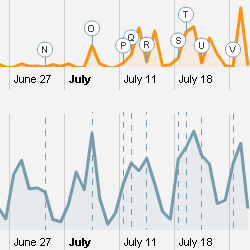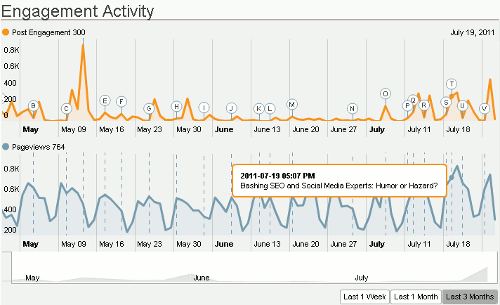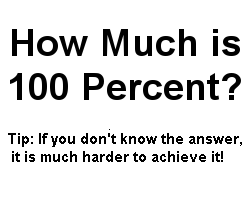
Have you ever been told that you work too much, or that your work seems to follow you everywhere? If so, I just want to offer up a thought that it may be because you are doing it wrong. Maybe I’m wrong, but what if I am actually right? Stick around and judge that for yourself.
I “unplugged” myself over the weekend, and it felt great. I spent very little time at a computer, and I only used my cell phone enough to be sure nothing was on fire in my professional life.
I remember times when I would feel guilty for taking a break like that, and I find that sometimes social media emphasizes the “rat race” feeling of having to be everywhere at once. Fortunately for myself and everybody around me, I learned how and why to let go of those guilty feelings.
I generally feel very proud of my work ethic. Doing my job well is important to me, and I know that a lot of other people must feel this way, too. I hope you do. A hazard that is easy to overlook is when you become so engrossed in work that you chase productivity right off a cliff. That is when the term “workaholic” generally applies. What workaholics often do not realize is when it is happening, or when to step back and take a fresh look. Allow me to share some thoughts and experience with you.
What if I Miss an Important Call?
Tell me if this sounds familiar. If you nod your head even once, I hope you have learned when and how to unplug. If not, maybe I can encourage you a bit.
I have been plugged into my job with the latest productivity tools that technology has to offer and remain that way year after year. I have carried smart phones since they first became available, and I have had mobile Internet at my side since its earliest availability. My job has always required it, and delegating the really important tasks to somebody else has often seemed impossible, or marginally possible but terrifying at best.
My example may be a bit extreme, but I know it will resonate with some micro-managers and other workaholics. You see, aside from being a marketing guy, I am also the CEO of a company that provides Internet services to service providers. Since 2000, I have been responsible for more servers operating in more data centers across America, and Internet connectivity to more end-consumers than all but very small number of people. When there are millions of dollars riding on things working perfectly 99.999 percent of the time, somebody has to hold ultimate accountability and make decisions in the event that thousands of websites or Internet connections are affected by a DOS attack or a router going bad. That is usually the guy with chest pains and a death grip on his cell phone.

My willingness to work harder and keep pushing my capabilities against all odds has served me well. I have grown some great companies, and I have had an exciting career. Like any career, it has had its ups and downs. Whenever it seems to become a bit lackluster, I start looking back into my career history to try and find patterns and to figure out what I am doing wrong … or what I am just not doing right.
A common reason I found for the productivity downturns is when I pushed a little too far beyond my optimal productivity and lost focus on the purpose of my career.
I think of it in terms of a Gaussian function … you know, like a bell curve. If you sit at the top of your productivity bell curve, you are doing it right. Pushing beyond that, you quickly enter a point of diminishing returns, and the productivity outcome is no longer worth the effort.
Yes, I am a math geek. Since I am a marketing guy, and a computer programmer on top of that, it should be expected. Don’t worry though, I will not drag you into a mathematical discussion of probability distribution.
Has Somebody Warned You About Workaholism?
Has anybody ever questioned how you keep on doing what you are doing? Maybe you have heard somebody ask “Do you ever sleep?” I have heard this a lot, but I always used to take it as a compliment. What I eventually realized is that it is sometimes better to take it as a caution.
I’ll give you an example. In about 2004, my wife told me that I was working too hard and that I needed to take more time for myself. She encouraged a hobby, so I began taking more time for an old passion of motorcycles. That carried on, and moved me on to my life-long passion for cars. Not just cars, but really fast cars, and racing them.

Once I realized the important reasons I was working so hard, things went gangbusters. My business went crazy! Things were better at home, and we had more babies. As crazy as this may seem, each baby gave me a pay raise. It happened because I worked smarter instead of working harder, and I learned the value of balance. Don’t get me wrong, I was still carrying all the technology and productivity tools with me. I have still been on-call 24 hours per day since the 1990’s, but once I realized that my career was just a part of the bigger job of being happy … I got happier!
The power of a refreshed mind, and the power of happiness may seem mythical at times. The common wisdom is that you must keep your nose to the grindstone, walk on fire, and a whole lot of other uncomfortable things. If you really believe it when people tell you these things are the keys to having a successful career, I believe you are doing yourself a disservice. Endurance is extremely important, and unplugging can provide huge benefits. It is not all about how much pain and tragedy you can endure.
Business and Career Require Endurance, But Not a Grindstone!
Having peace in your career, and realizing that it is an endurance race and not a short sprint is a big step toward succeeding. Enjoying what you do, and looking closer at why you are doing it is far more valuable than grinding your nose and burning your feet. I am saying this from experience, and what I truly believe.
In a look-back, I find things I have known for years and told myself I would never forget, but I still seem to forget them somehow. One of them is the wisdom of knowing when to disconnect, and actually having the courage to do it. “Unplugging” can be a great chance to reboot and resume greater productivity, but easy to neglect until later.
I have been taking a closer look at myself and my career history recently. I look at some of the peaks in my own career, and I find that some of the most productive times have been when I realized when to push less. Sometimes the timing did not seem logical, because conventional wisdom says that when you are riding a huge wave, it is the time to surf with all you’ve got. Unconventional, but often more productive wisdom says that if you are not careful, burnout can set in even faster than expected.
My best times ever have come after remembering to relax just a little more and stop punishing myself. It has been a little while since I felt this way, but when I knew it and remembered it, I got happy. In fact, I got happy enough that I was earning more money every week or two than an average American family was per year … all while struggling less, working fewer hours, and enjoying everything a lot more than before.

I pushed like crazy to build a company to pay me enough to feel satisfied. I kept pushing for as long as I saw continual progress, but then I learned when it was time to unplug, and even face my fears to delegate a few tasks when it was appropriate.
I think I’ll try that again. It was sure more fun than feeling guilty to take in a little leisure. It was more profitable, too!
I have just one more bug to put in your ear. If you know somebody needing to delegate their marketing more wisely, I will be delighted to hear from them. Oh, or a race team looking for a wining driver … I am well-qualified for that, too! 😉
Podcast: Play in new window | Download









